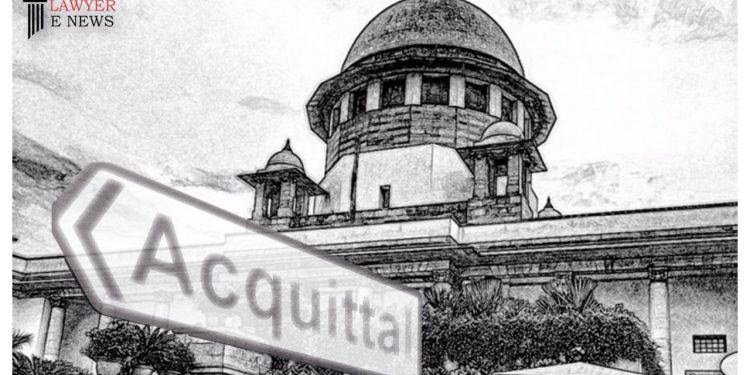-
by sayum
17 February 2026 8:32 AM



In a significant ruling, the Supreme Court of India acquitted the appellants in a murder case, stating that they are entitled to the “benefit of doubt.” The judgement, delivered by Hon’ble Mr. Justice Vikram Nath and Hon’ble Mr. Justice Ahsanuddin Amanullah, sets aside the conviction and sentence awarded by the Trial Court and confirmed by the High Court.
The case, Criminal Appeal No.1235 of 2011, involved a dispute over land ownership between the accused and the deceased, who were close relatives. The incident occurred on 9th February 1997, when the deceased, along with his wife and two children, was attacked by the six accused near their village. The deceased was assaulted with various weapons, leading to his untimely death.
Throughout the trial, the prosecution’s case primarily relied on the testimony of the deceased’s wife (PW1), who was the only witness of fact examined. However, the Court highlighted several discrepancies in the witness statements and raised concerns about the absence of key witnesses, including Babu Ram and Tejpal, who were named in the First Information Report (FIR) but were not examined during the proceedings.
Additionally, no recovery of the weapons used in the crime was made, further raising doubts about the veracity of the prosecution’s case. The defense put forth arguments suggesting false implication, which the Court considered in light of the lack of substantial evidence.
The Court’s judgment noted, “Enmity between the parties is a double-edged sword, it cuts both ways. The accused could have committed the crime. On the other hand, it could be a case of false implication.” This observation played a crucial role in the Court’s decision to grant the appellants the benefit of doubt.
The conduct of the witnesses during the assault also raised eyebrows, with PW1 and others allegedly standing away while the incident unfolded and failing to intervene or seek help. Moreover, the FIR was lodged with a delay of a couple of hours, and the special report to the Magistrate and superiors was sent two days later, prompting the defense to suggest that the FIR was anti-timed.
Supreme Court concluded that the prosecution failed to establish guilt beyond a reasonable doubt, leading to the acquittal of the appellants, Ram Kumar and Ram Pal. The Court canceled their bail bonds and discharged their sureties.
DATE OF DECISION: 19th July 2023
RAM KUMAR & ORS. vs THE STATE OF UTTARAKHAND
